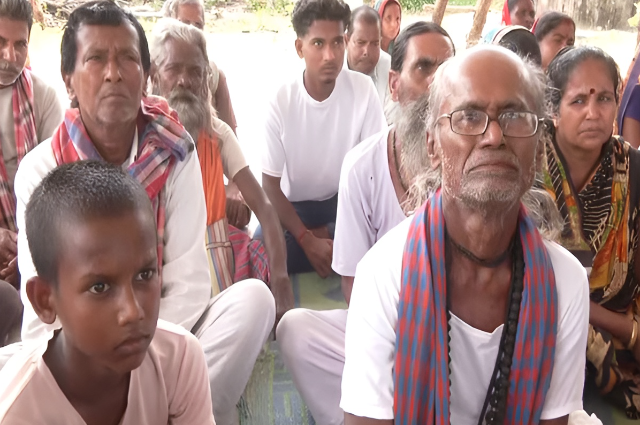
In Maharashtra’s Gadchiroli district, around 50,000 Hindu refugees who fled from Bangladesh have been living in harsh conditions for decades. These refugees face numerous challenges as particularly in an area troubled by Naxalite activity. Despite their long-term settlement in India, they lack access to essential facilities such as roads, electricity, education, and healthcare. Over the years, these refugees have fought tirelessly for fundamental rights including land ownership, access to education in their native Bengali language, caste certificates, reservations, and most importantly, citizenship.
The Challenges of Citizenship and the CAA
The Citizenship Amendment Act (CAA), which was intended to simplify the process of gaining Indian citizenship for persecuted minorities from neighbouring countries has ironically made it harder for these refugees to meet the requirements for citizenship. Many of them continue to live in a state of legal dividing line. The Nikhil Bharat Bengali Sharnarthi Samanvay Samiti, an organization dedicated to advocating for these Bengali Hindu refugees has been fighting their cause for several years by demanding justice from the Indian government.
"India is Our Mother": Refugees Speak Out
Dr. Subodh Biswas, the National President of the Nikhil Bharat Bengali Refugee Coordination Committee, emphasized the deep connection the refugees feel with India. “Nobody wants to leave their own country,” he stated in an interview. He explained that the Bangladeshi Hindus see India as their motherland, which is why they fled here in the first place. However, despite this bond, they continue to feel discriminated against. Dr. Biswas pointed out that the refugees are still struggling to gain basic legal rights such as land ownership, caste certificates, and citizenship. He expressed disappointment with the CAA rulings, while still holding trust in Prime Minister Narendra Modi and Union Home Minister Amit Shah to eventually provide a solution.
Stories of Displacement and Hardship
The story of the refugees is one of hardship and survival. Bidhan Bepari, a refugee who arrived in India in 1964 shared how unsafe life was in Bangladesh by prompting his family and around 2 million others to seek refuge in India. The conditions were harsh when they first arrived. “The area was full of wild animals and there was nothing to eat,” Bepari recalled. Over time, they cleared the forests and began farming but the struggle to gain citizenship persists. He noted that 80% of the refugees still do not have citizenship and despite India’s independence in 1947, they do not feel a sense of freedom. Their demand is simple: citizenship, legal land ownership, and caste certificates to secure their future.
A Cry for Recognition and Rights
Another refugee, Maharani Shuken had recounted her family’s escape from Bangladesh when she was just a year old. Her father brought them to India to escape the violence, but life in India was no easier. They received land and livestock, but poverty continued to plague them. Over time, their land has been divided and shared leaving them with little to sustain themselves. Shuken resonated with the demands of others by urging the government to provide caste certificates and legal rights to the land they were given.
For these Bangladeshi Hindu refugees, the fight for recognition and basic human rights continues. Despite decades of living in India, they remain without citizenship or the benefits that come with it. They have worked hard to build a life in India, clearing forests, growing crops and contributing to the economy, yet they remain marginalized. Their plea to the central government is clear: provide us with citizenship, land rights and caste certificates so that we too can live freely and with dignity.
Attacks on Hindu Temples in Bangladesh: A Cause for Concern after the Aftermath of Student Protests
Following the student protests in Bangladesh, several Hindu temples including the ISKCON and Kali temples were destroyed. While these attacks may not be the immediate cause of migration, as attacks on minorities in Bangladesh have taken place irrespective of the ruling party and there could be a gradual process in play, opined Pallab Bhattacharya.
Sheikh Hasina's Appeal to India
When Sheikh Hasina, the Prime Minister of Bangladesh, dialed New Delhi on August 5 with a frantic appeal to be allowed into Indian territory, the Government of India's decision to allow her safe passage was perhaps, the only available option under the circumstances. What weighed in favour of the Centre's decision to allow Hasina into the country was, no doubt, her unambiguously warm and friendly relationship with India over the years and her movement against religious extremism and terrorism, resulting in a severe crackdown on anti-India militant outfits operating from Bangladesh.
Denying Asylum to Bangladeshi Minority Hindus
In sharp contrast, the Indian government's subsequent decision to deny asylum to the persecuted Bangladeshi minority Hindus in India goes against its consistently held position of making India the "natural home of persecuted Hindus around the world". Reports continue to pour in about the ongoing religious persecution of minority groups in Bangladesh with scores of Hindu teachers being forced to resign and other officials and academics being racially profiled.
The Alarming Situation for Minorities in Bangladesh
Reportedly, there have been as many as 205 cases of attacks on members of the minority communities in Bangladesh after August 5, with five confirmed cases of deaths. Neem Chandra Bhowmik, president of Bangladesh Hindu, Buddhist, Christian Unity Council in an interview with The Indian Express had stated: "We have been getting reports of vandalism, intimidation and threats on the telephone from 52 of the 64 districts; the situation is dynamic… we are constantly trying to verify them."
The Need for Action
The attacks on Hindu temples and the ongoing persecution of minority groups in Bangladesh are deeply concerning. The international community must take notice of this situation and put pressure on the Bangladeshi government to protect the rights of its minority citizens. It is crucial that the Indian government also reconsiders its stance on providing asylum to persecuted Hindus from Bangladesh, as it is a matter of humanitarian concern.
. . .
References:
